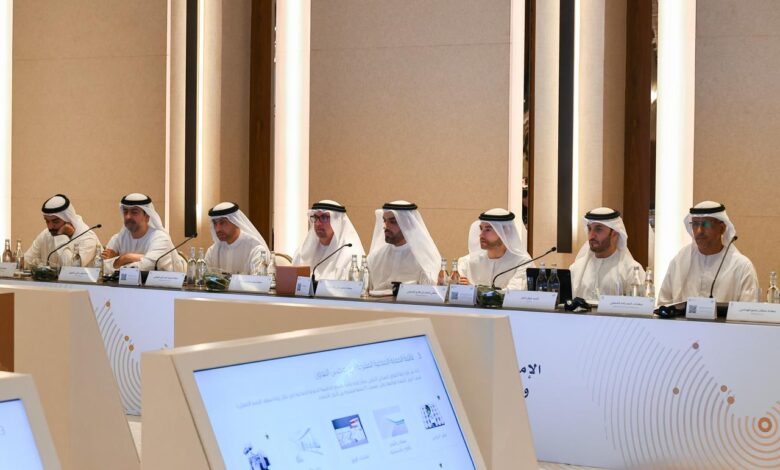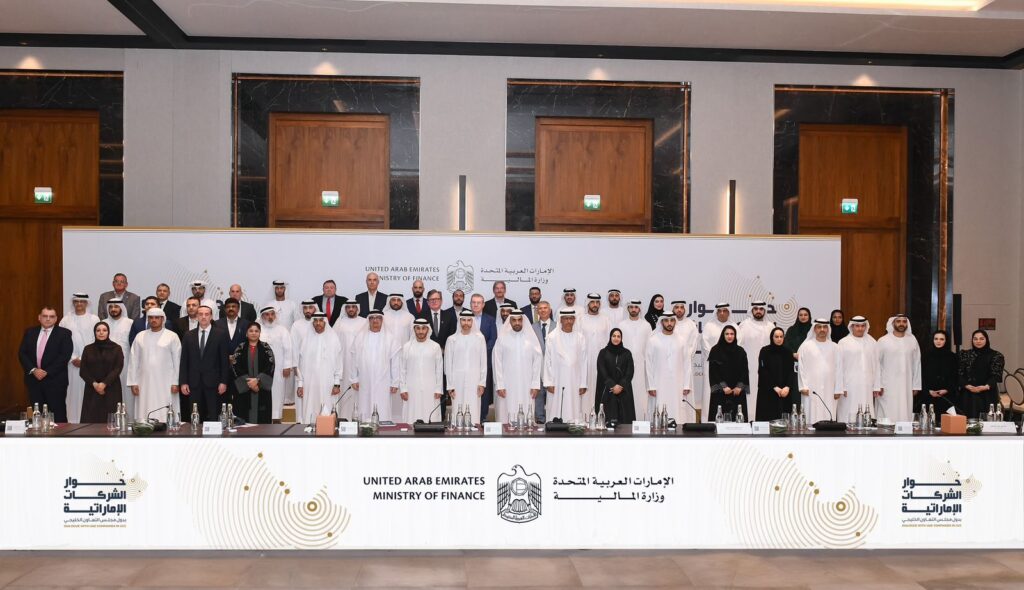The Ministry of Finance Organises First Dialogue with Senior Officials of National Companies Operating in the GCC

The Ministry of Finance today organised its first dialogue in Dubai with senior officials from national companies operating in the GCC states. The meeting discussed the progress of joint Gulf economic efforts as well as ways to enhance economic and financial integration among GCC countries.
It also shed light on the opportunities and challenges within the Gulf Common Market and Customs Union and the role of national companies in strengthening the Gulf economy.
The event was attended by H.E. Mohamed bin Hadi Al Hussaini, Minister of State for Financial Affairs; H.E. Younis Haji Al Khoori, Undersecretary of the Ministry of Finance; His Excellency Saeed Rashid Al Yateem, Assistant Undersecretary for Resources and Budget Sector at the Ministry of Finance; H.E. Maria Hanif Al Qassim, Assistant Undersecretary for Policies and Economic Studies at the Ministry of Economy; H.E. Humaid Mohammed bin Salem, Secretary-General of the Federation of UAE Chambers; and HE Mohammed Ali Rashed Lutah, President & CEO of Dubai Chambers.
Also present were H.E. Dr. Ahmed Rashid Al Shemaili, Acting Director General of Ras Al Khaimah Chamber of Commerce and Industry; H.E. Safeya Hashem Al Safi, Acting Assistant Undersecretary for the Commercial Control and Governance Sector at the Ministry of Economy; Fatima Yousif Alnaqbi Acting Assistant Undersecretary for Support Services; Ali Abdullah Sharafi, Assistant Undersecretary of the International Financial Relationship Sector at the MoF; and senior officials from more than 80 national companies.
Representatives from the Ministries of Finance, Economy, Industry, and Advanced Technology and the Federal Authority for Identity, Citizenship, Customs, & Port Security participated in the presentations during the sessions.
The dialogue aims to strengthen communication between the Ministry of Finance and officials from national companies operating in GCC countries, raise awareness of the importance of GCC economic integration, and share experiences and updates on the progress of the Customs Union and Gulf Common Market.
The sessions also focused on outlining future steps for implementing these initiatives, contributing to achieving full economic integration.
Driving Development
HE Mohamed bin Hadi Al Hussaini stated: “This dialogue reflects the Ministry of Finance’s ongoing efforts to open new avenues for cooperation
and expand partnerships with all relevant stakeholders, supporting the Gulf economic integration.
“Through its role in the joint GCC economic framework, the Ministry firmly believes that economic and financial integration among the GCC countries is a key pillar for achieving shared progress and prosperity.
As part of our work under the Unified Economic Agreement, we are committed to advancing the GCC’s vision of strengthening the Gulf Common Market, which provides a valuable opportunity to drive economic development across the GCC countries,” Al Hussaini said.
The Ministry of Finance Combined efforts
His Excellency added: “The Ministry of Finance will spare no effort to provide a transparent and open platform for dialogue, where economic and financial issues of mutual interest can be discussed, and constructive ideas and initiatives can be shared.”
“In today’s rapidly evolving economic landscape, it is more important than ever before that we join efforts and work collaboratively. National companies operating within the GCC play a pivotal role in driving economic development, showcasing the strength and diversity of our economies through joint initiatives, building a robust economic infrastructure, and diversifying income sources.”
Al Hussaini emphasised that highlighting the successes of joint GCC economic efforts, exploring future cooperation opportunities, and supporting national companies in the GCC to achieve their ambitious goals are key steps toward deeper integration in various economic sectors.
He also noted that the Customs Union and Gulf Common Market, which are built on the principles of joint economic cooperation, offer national companies and investors significant opportunities to expand their operations and benefit from enhanced economic and financial integration.

Key discussions
The event commenced with a presentation by the Ministry outlining the process of Gulf economic cooperation and the various stages of economic integration. This journey began with the signing of the economic
agreement, progressing through the stages of free trade and customs union, leading to the establishment of the Gulf Common Market.
The presentation also highlighted key projects currently being followed up on within the framework of the Financial and Economic Cooperation Committee, as well as decisions made at the GCC level related to the customs union and Gulf Common Market.
Discussions also tounched on completing the remaining steps to fully establish the customs union and implementing the Gulf Common Market’s tracks according to a specified timeline.
Additionally, the dialogue featured a detailed presentation on the Gulf Customs Union, highlighting the progress of the Customs Union Authority, the decisions made by its Board of Directors, and the latest developments on 20 projects necessary for establishing the Customs Union, with 18 currently underway and an average completion rate of 67%.
Key projects include the implementation of a unified detailed list for the description and coding of goods, the adoption of unified customs procedures for security and safety at all primary entry points, the creation of a customs data model aligned with World Customs Organisation standards, and the establishment of uniform information collection standards across GCC countries.
Additionally, efforts are being made to develop a unified mechanism for the movement of goods, standardise the list of restricted and prohibited items, harmonise non-tariff restrictions across GCC countries, and agree on a temporary mechanism for handling national goods until a unified tariff and trade policies are established within the Customs Union.
The dialogue also addressed various challenges facing the GCC Common Market, such as differences in economic regulations and legislation between member states, and the need to unify monetary and financial policies to achieve a more integrated market. Discussions highlighted the importance of harmonising non-tariff restrictions and agreeing on a temporary mechanism for national goods.
Furthermore, participants stressed the need to enhance transparency and facilitate the movement of capital and goods between GCC countries,
which would help create an attractive investment environment for companies and investors across the region.
Private sector role
The event addressed the private sector’s role in advancing economic integration among GCC countries, emphasising that the private sector can serve as a powerful driver of economic growth by investing in infrastructure projects, fostering innovation, and launching entrepreneurial initiatives that boost the competitiveness of GCC economies.
Speakers highlighted the importance of strengthening public-private partnerships to achieve the strategic objectives of the GCC Common Market. This can be done by removing trade barriers and facilitating regular economic dialogues to share experiences and best practices across GCC member states.



